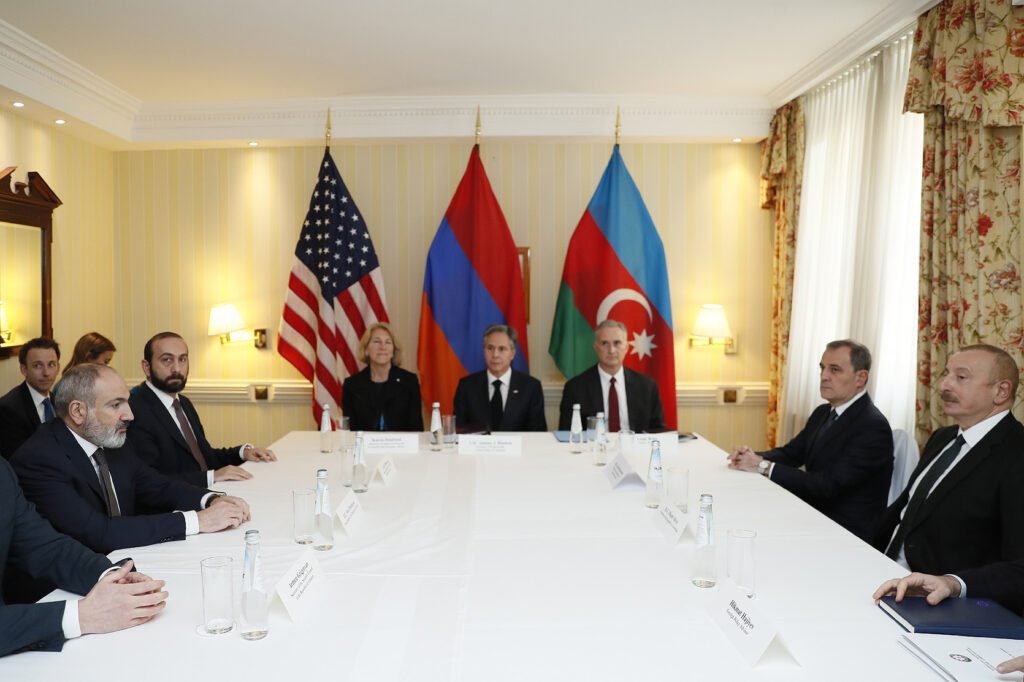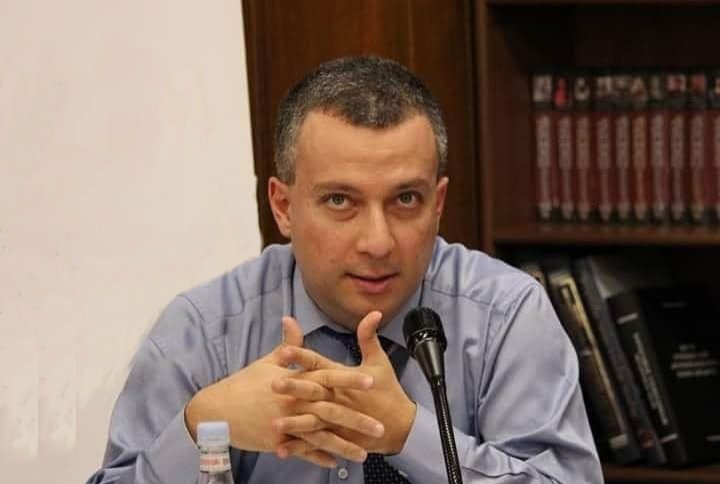In recent months, Armenia-Azerbaijan negotiations entered a digital phase. Armenia has been working on the text of the peace agreement, adding suggestions and sending them to Azerbaijan. Baku reviews them, mostly rejects Armenian suggestions, adds its ideas and sends the document back to Armenia. Yerevan again inserts its suggestions into the text, rejects some Azerbaijani ideas, and the document flies back to Azerbaijan. It is challenging to assess how the documents are being transmitted between sides, through some secure digital channels or mediators in hard copy versions. Regardless of the technical details, the process is a reminder of the publication process of an academic article when reviewers look through the text and suggest amendments and modifications before accepting the paper for publication. In this case, the reviewers and authors are the same persons, which adds some peculiarities.

The Pashinyan-Aliyev summit at the Munich Security Conference, facilitated by the US Secretary of State, seemed to break this circle and paved the way for the resumption of face-to-face meetings. Immediately after the Munich summit, the US State Department’s representative announced the upcoming meeting of Armenian and Azerbaijani leaders in Brussels. The Brussels format was perceived as an effective platform for reaching agreements. However, the process was stopped after the August 31 meeting, followed by Azerbaijani aggression against Armenia in September 2022. During his recent press conference, Prime Minister Nikol Pashinyan criticized the Brussels format, arguing that more than 10 agreements reached during negotiations were never realized. According to Pashinyan, there is no sense in continuing negotiations in Brussels and reaching new agreements before the realization of already-approved ideas.
Meanwhile, Azerbaijan resumes its assertive actions and rhetoric. Overtly ignoring the International Court of Justice’s decision to end the Lachin Corridor blockade, Azerbaijan launched a subversive action in Nagorno Karabakh on March 5, 2023, killing three Armenian police officers. President Aliyev made a belligerent statement during the Nowruz celebration in Azerbaijan on March 18. He argued that if Armenians would like to live peacefully on 29,000 square kilometers, their government should accept Azerbaijani conditions of the peace agreement. That is, to recognize Nagorno Karabakh as part of Azerbaijan without any international presence or international guarantees for the protection of the rights of the Armenians and launch a delimitation and demarcation process based on Azerbaijani conditions. Otherwise, according to Aliyev, there would be no peace treaty. Putting aside President Aliyev’s attempt to reduce the territory of Armenia by 800 square kilometers, from 29,800 to 29,000, the statement was almost an ultimatum; either Armenia signs capitulation, which Azerbaijan calls a peace treaty, or Azerbaijan launches new attacks against Armenia, Nagorno Karabakh or in both directions. In recent days, Azerbaijan has been actively preparing the ground for a new escalation, accusing Armenia and Nagorno Karabakh of violating the ceasefire and transporting weapons and soldiers from Armenia to Nagorno Karabakh. Simultaneously, Azerbaijan has concentrated significant troops along several parts of the Armenia-Azerbaijan border. By rejecting any options for an international presence in Nagorno Karabakh and international guarantees for protecting the rights and security of Armenians, Azerbaijan is sending a clear signal that it will not tolerate Armenian presence in Nagorno Karabakh, at least in current numbers. Theoretically, Azerbaijan may agree to have several thousand Armenians there, using them as a showcase for international media to prove its so-called “tolerance,” but this will be a classic example of “soft ethnic cleansing,” similar to what happened in Nakhichevan during 1921-1988, when the Armenian population declined and eventually reached zero.
Simultaneously, Azerbaijan is assertively pushing forward the concept of “Western Azerbaijan,” arguing that the territory of Armenia was part of Azerbaijan, and Azerbaijanis should “return to their homeland.” Currently, Azerbaijan uses this concept as a stick to force Armenia to drop its demands for international presence in Nagorno Karabakh. Baku argues that it will agree to an international presence in Nagorno Karabakh only if Azerbaijanis return to Armenia, and Yerevan agrees to establish an international presence and mechanisms to guarantee their rights. However, as the concept of “Western Azerbaijan” gains more acceptance in Azerbaijan through the direct support of the state, there are no guarantees that even if Armenia drops its demands on Nagorno Karabakh and accepts the notion of Nagorno Karabakh without Armenians, Azerbaijan will stop pushing the concept of “Western Azerbaijan.”
Armenia-Azerbaijan negotiations have reached a dangerous point. Since December 2021, Armenia has made significant concessions, first agreeing to discuss the autonomy of Nagorno Karabakh within Azerbaijan and later dropping any mention of status, calling only for an international presence to secure the rights of Armenians. However, Azerbaijan has not made any reciprocal steps, continuing to push forward its narratives. Azerbaijan claims that the conflict is over; Nagorno Karabakh was destroyed during the 2020 war, and Azerbaijan will never accept any international presence or international guarantees to protect the rights of Armenians. According to Azerbaijan, if Armenia does not accept Azerbaijani demands, Azerbaijan will not recognize Armenia’s territorial integrity, pushing forward the concept of “Western Azerbaijan.”
On March 22, an Armenian soldier was killed in Yeraskh, a village in the Ararat region located only 60 kilometers from Yerevan. Many signs indicate that Azerbaijan may launch a new attack against Armenia and Nagorno Karabakh soon. While protecting its territory is the first and foremost responsibility of Armenia, international actors involved in the region should not simply sit and wait, as any new escalation will make the prospects of regional peace and stability less likely.



Armenia is taking unprecedented measures of diplomatic pressure in the international arena in order to achieve recognition of the Armenian genocide. A nation that claims to be a victim of one of the loudest crimes of the 20th century, that demands to hold countries and nations accountable a century later, that demands sanctions against its neighbours, is knowingly and actively participating in the most blatant crime against a once brotherly people. In fact, right now Armenia is up to its neck in what has been repeatedly called the genocide of the Ukrainian people.
And Turkey was and is still guilty for the ongoing Armenian Genocide in alliance with Azerbaijan.
Maybe you don’t know the definition of the word genocide?
There have Armenians in Ukraine for centuries. The modern nations of Armenia and Ukraine haven’t been that friendly namely little direct interaction for geographical reasons, even when Ukraine had a practical and not outwardly adverserial relationship with Russia prior to 2014 , Armenia being aligned with Russia means that it was distrusted by Ukraine for that reason reason. Whilst the fabric of Ukraine has been shredded by the war the death toll is nowhere near enough to be a genocide and Ukraine has a distinction of having the only case where the genocide of Armenians was revoked as part of its friendships with Turkey and Azerbaijan.
In a more global sense there is no logic to their behavior. I mean, what was the purpose of the 2020 war in that case? Thousands died. And it ended. But after all it didn’t end? Why sign the ceasefire agreement then, if you were supposedly so strong?
IMHO , much of the current conflict is about ownership and control of substantive gold (and other metals) mines. There is significant information available in the public domain for those who seek to understand the situation more fully. The gold deposits run across the boundaries of Armenia, Artsakh and Azerbaijan. Look at the investors and holding companies to understand who the players are.